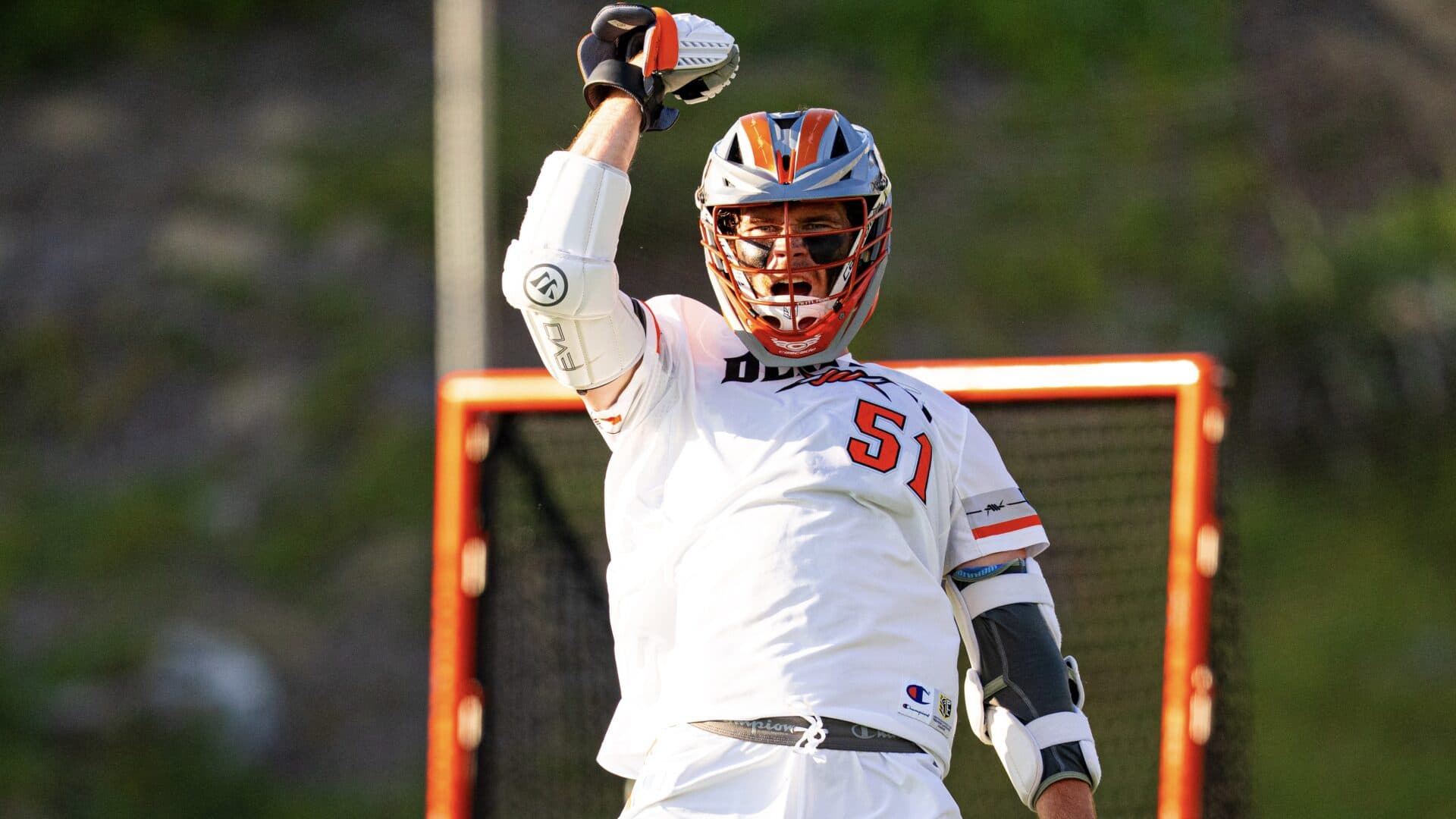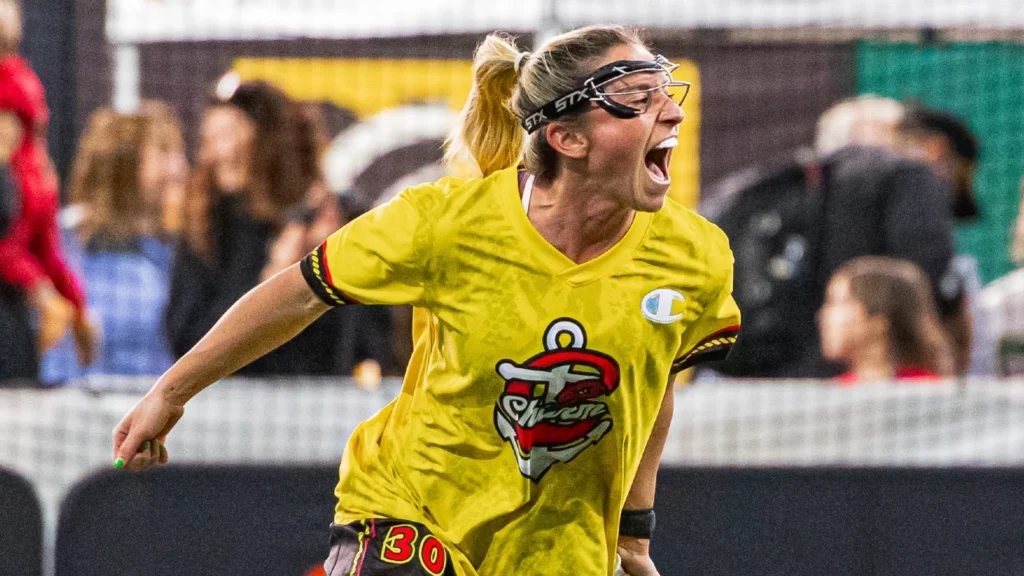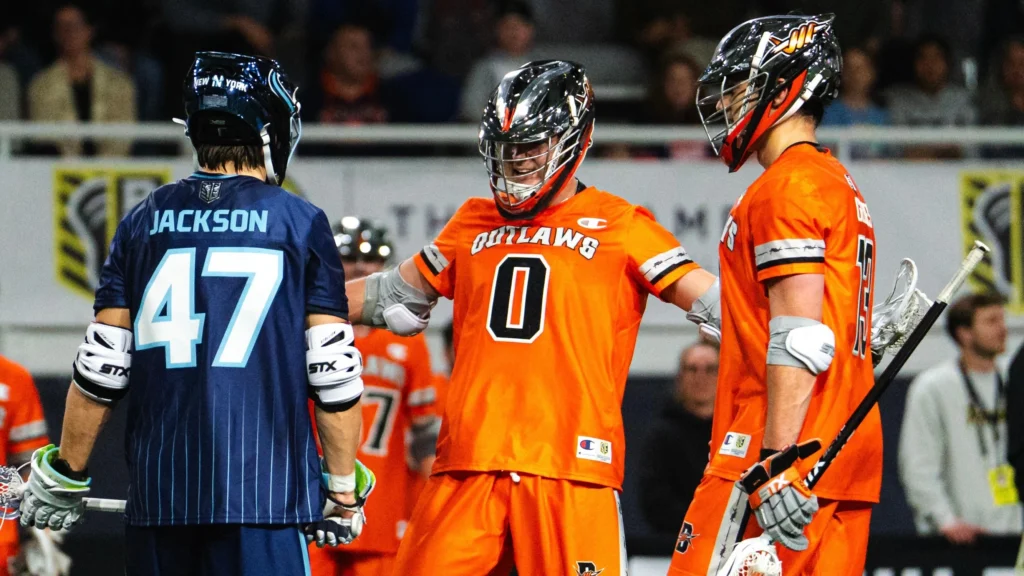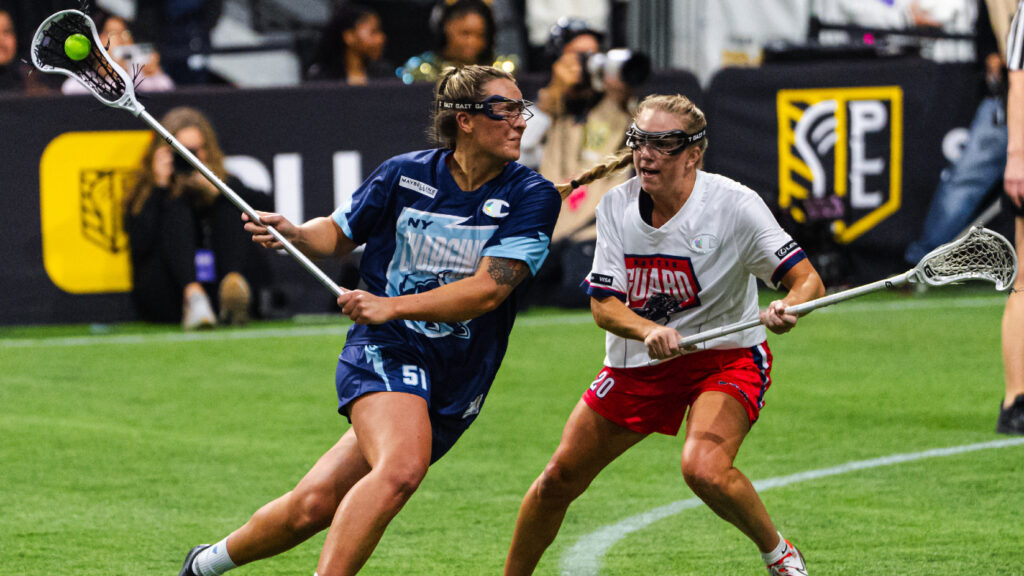Denver Outlaws vs. California Redwoods
Topher Adams: MVP performances unlock full strength Outlaws
Denver has the talent to be one of the best offenses in the league. But, as all the new faces built chemistry, there was a step missing. There were too many cooks and too little ball movement. Now that the Outlaws have reached the midway point of the season, Denver has found its formula.
It starts with the new alpha on offense: Pat Kavanagh. When the Outlaws traded for the 2024 Tewaaraton Award winner, they wanted to make him the quarterback. He’s fully taken the reins and turned in a bonafide MVP-level showing against the Redwoods.
Kavanagh registered career highs in points (8), goals (5) and ground balls (4) as Denver put on its best offensive showing of the season.
His dominance set the tone and the rest of the Outlaws stars filled in around him. Brennan O’Neill, Logan Wisnauskas and Jared Bernhardt had three points each. Eight different players had multiple points.
The ball hummed – Denver had 11 assists on the night — and the Outlaws started to shoot to their potential, finishing 40.5% of their chances against the Redwoods.
For everything Kavanagh and the offense is doing on one end, Logan McNaney is sparking equal dominance on the other.
McNaney had his “worst” game as a pro, making 15 saves at 60%. He’s eclipsed the 60% mark in every game he’s started and continued to make clean saves at a superhuman rate, sparking Denver’s transition offense.
The Outlaws are allowing just 9.7 goals with McNaney in cage and averaging 13.3 goals offensively during this current three-game winning streak. The pieces are in place and playing up to the level. Denver looks like a Tier 1 contender.
Up next for Denver: Saturday, July 12 vs. Maryland Whipsnakes (9:30 p.m. ET)
Phil Shore: Redwoods defense struggles against hot Outlaws offense
The Redwoods chased the Outlaws the entire game both figuratively on the scoreboard and literally on the field.
Aside from an early 2-1 lead thanks to a Chris Kavanagh two-pointer early in the first quarter, California trailed from the 6:15 mark in the first quarter throughout the remainder of the game. While they kept things close throughout to the point where Outlaws head coach Tim Soudan said the third quarter felt like the Outlaws were behind, things fell apart for California in the fourth quarter, getting outscored 7-2 and eventually losing, 18-12.
“We start slow. We creep our way back in, and we continue to make really stupid mistakes that, ultimately, cost us the game,” Brian Tevlin said. “This game was not a clean game by any stretch of the imagination, and we just kept giving them opportunities to take it from us, which hurts because it was right there for us.”
Denver stretched the California defense, leaving players on an island by themselves and causing long slides that came too late. Soudan said the team had been working on their spacing through the first few weeks of the season. He added that the team started in a pairs offense, which opened up the middle of the field, and then moved into an open-set offense, which caused a lot of long slides.
O’Neill said the offense was learning each other’s tendencies and what guys like to do on the field, which helped create space for players to run at. Pat Kavanagh, who tallied a game-high eight points (5G, 3A), said he was familiar with a lot of the California defenders thanks to their time playing at Notre Dame together, and he knew they were likely to change matchups, saying they “switch picks more than any team in the league.”
“We were getting a lot of favorable matchups, a lot of our attackmen on short sticks,” he added.
California was playing its first game without short stick defensive midfielder and captain Chris Merle, which meant there was some shifting of responsibilities on defense. BJ Farrare, who played long-stick midfielder in the first three games, featured as an SSDM against Denver while Cole Kastner made his professional lacrosse debut at LSM.
Tevlin said that any team would be lucky to add a player like Kastner and that his ability to cover was “second to none,” but that it may take “a game or two” to work his way into the system.
Offensively, the Redwoods continued to get production from its top three picks from the 2025 draft. Andrew McAdorey led the team with five points (2G, 1T, 1A) followed by Kavanagh (1T, 1A) and Sam English (2G, 1A). It was only the fourth time in PLL history when a team got three or more points from three different rookies in the same game.
McAdorey was the player the team turned to when it needed a spark. His goal in the second quarter kicked off a run when the Redwoods scored four of the next five goals; that included him scoring the first goal of the third quarter to close the deficit to one. His two in the fourth quarter was the team’s only score in the final frame, cutting a four-point deficit to a two and giving the Redwoods another brief moment of hope they could come back.
Head coach Anthony Kelly said there wasn’t a set call to get McAdorey the ball, but that he is a competitor that demands the ball when the team needs a lift. Ryder Garnsey also had high praise for McAdorey.
“He’s just flat out one of the best midfielders in the league,” he said. “When you need to make a play, and you have one of the best midfielders in the league, you give him the ball. He’s done a great job making great decisions. He’s shooting at a high clip, so we’d be stupid not to give him the ball in some of those situations.”
The loss bumps the Redwoods out of first place in the Western Conference, but they won’t have much time to dwell on it as they play the Philadelphia Waterdogs in the second leg of their Homecoming Weekend.
The immediate message from the head coach was a simple one:
“We just need to be better,” Kelly said. “The defense was not good today. We have to figure out what that is, and we need to come out tomorrow and be better.”
Up next for California: Saturday, June 28 vs. Philadelphia Waterdogs (6 p.m. ET)
Utah Archers vs. New York Atlas
Paul Lamonaca: Lopsided faceoff battle helps New York win their second straight
Despite a slow start to the game that saw New York trailing 5-3 heading into the second quarter and turning the ball over for a season-high 26 times, the Atlas stuck to their game plan to pull off their second straight win heading into All-Star weekend.
New York dominated the possession game led by All-Pro faceoff specialist Trevor Baptiste who won 19-of-23 (86.4%) of his draws and notched a goal in the first quarter.
The Atlas’ defensive matchups settled as play continued after a two goal burst by Grant Ament to start the game. New York then decided to double-pole Utah’s midfield group that went silent as the evening progressed. Tom Schreiber was held to zero points along with Ryan Ambler and rookie Sam King. Utah’s offense shot just 22.2% on the evening.
New York head coach Mike Pressler praised his goalkeeper Liam Entenmann for holding Schreiber scoreless as well as making a number of late-game saves to help seal the victory for the Atlas.
“I think Liam Entenmann has a lot to do with that,” Pressler said. “People all cut a fine line to throw it by him, but as the game progressed and after that first quarter Liam just got better and better. Again, another great job by 44 between the pipes.”
While not recording a save in the first quarter, Entenmenn finished the game with eight stops on 16 shots on cage.
On the offensive end, rookie Matt Traynor exploded for four points (2G, 2A) on the evening, finding the majority of his success in New York’s invert offense.
“Matt has been spectacular since he got here,” said Pressler. “From training camp, all the way through the first five games. The more we play him, the better he gets and that’s gonna be a theme moving forward. We got him behind the goal a couple of times, all those great years playing attack at Penn State, so he’s got a great feel back there.”
Connor Shellenberger finished with three points (2G, 1A) and Xander Dickson notched with two goals. New York’s game plan for their midfield group to continuously set picks for their attackmen proved to be successful as off-ball play helped earn New York goals that were not viable from initial dodges.
Up next for New York: Friday, July 11 vs. Boston Cannons (7 p.m. ET)
Zach Carey: Archers offense continues to come up short
The story for the Utah Archers through four weeks continued in the fifth as their offense could not do enough to complement a lockdown defense that limited another high-octane attack.
The Archers did not score for the final 16:17 of action against the Atlas. After putting up five goals in the first quarter, the offense went quiet from there on out as New York adjusting to shorting Max Merklinger at attack threw off Utah’s ability to win matchups in the midfield.
“We scored three goals in three quarters,” head coach Chris Bates highlighted postgame. “Ain’t great. … We held a team to 10 goals and we only scored eight, not going to win a lot [doing that]. So, frustrating on that end of the field. We’ve got to figure ourselves out.”
Utah has scored more than 10 goals once in five games and is averaging just 9.2 scores per game (second worst in the league). The individual threats have all had their moments, but the team spacing, ball movement and cohesiveness has been lacking. Goals have come from players like Grant Ament (2G, 1A) and Connor Fields (3G) winning individual matchups on occasion, but not consistently across the board.
“We’re having trouble beating people,” Bates said. “Grant shook some guys a little bit. Fieldsy, he does his thing. But we’re not drawing too many slides and not getting the ball moving off hedges or when they slide.”
Turnovers and general sloppy play have been a factor. As has the dire lack of faceoff wins that has limited the offense’s volume of possessions and ability to find a rhythm. Mike Sisselberger won just 3-of-21 faceoffs on Friday night, bringing his season average down to 35.6% which is last in the league among starting faceoff specialists.
While the Archers’ strategy of starting a short-stick defensive midfielder at attack helped lessen the impact of the Atlas’ 32-second offense, they also suffered from possessing the ball for 6:30 less than New York did.
“It’s not ideal,” Bates said, saying he also wants to see more from the team’s faceoff wings. “That’s not all on Siss. … Every team in this league is talented and to give them six and a half minutes, that’s a pretty startling statistic. You’re not going to win many games [doing that].”
Utah’s defense continues to be stout, still ranked first in the league in scores allowed per game at 10.0. The offense is the head-scratcher and is what has limited the two-time reigning champs from playing to the potential they’ve performed at the last two seasons. This is still a championship-contender with the talent, experience and pedigree to peak at the right time and make a run. Plus, Tre Leclaire’s return – expected in mid-July according to Bates – should help matters.
But a few jingles of alarm bells are also starting to sound for an offense that is averaging single-digit scores per game and needs to figure itself out sooner rather than later in the second half of the regular season.
Up next for Utah: Friday, July 11 vs. Philadelphia Waterdogs (9:30 p.m. ET)
